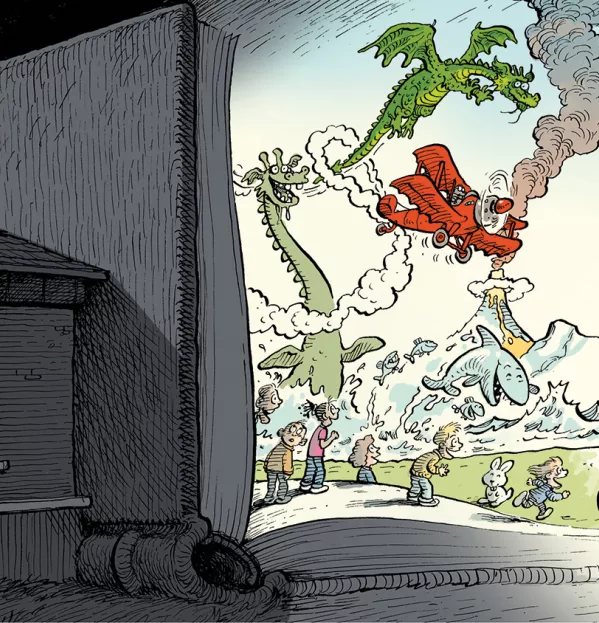
Each library contains its own world of possibilities

Literacy levels, one of the greatest drivers of social inequality in the UK today, are in decline. According to the Fair Education Alliance, up to three in five socioeconomically disadvantaged children leave primary school without achieving the expected standard of reading; sadly, many of them go on to fall further behind in their schooling, lack self-confidence and face a future with significantly diminished opportunities.
This is an uncomfortable fact, but our school and community libraries - a national institution that has been around since 1850 - could be a solution to the problem. We all agree that reading is a life skill that all children should gain by the time they leave primary school. But, as Save the Children research for the Read On, Get On campaign found, every year, nearly 148,000 children leave primary school in England unable to read well. This includes one-third of children growing up in poverty.
The issue extends into secondary schools where children, young people and their families are still not receiving an equal opportunity to read and read widely, yet facilities are available in public and school libraries. According to one research study, less than one in five (18 per cent) children now buy books for themselves with their own money.
Yet, according to a 2013 study from the UCL Institute of Education, if a 16-year-old reads books and newspapers regularly and visits the library, this is four times more of an advantage for their progress than if they had a parent with a degree (see bit.ly/ReadingProgress).
Learning a skill
Families, schools and libraries all have a crucial role to play here. When children begin to read for themselves, they open a door to an amazing, rich world of fantasy, adventure and information.
But, as with learning any skill, children need help. It is demanding work, it takes time, but by working together in partnership with parents and the local community, children and their parents can gain in confidence to become successful readers, as the teachers at St John’s Primary School in Cheltenham have demonstrated.
St John’s believes that for children to become successful readers, they need to take ownership. Older children supervise and encourage the younger children by playing reading games. Other activities involve children using a text or a poem of their choice to work with a partner or in small groups to discuss and critique it. The school’s new initiatives are not just for the children.
All of St John’s teachers are involved in a peer-mentoring scheme, which is currently focusing on reluctant and vulnerable readers. Parents are encouraged to hear their children read regularly, whatever their age. The school also involves the local community to promote reading for pleasure. Importantly, classes visit the local library.
The 1850 Public Libraries Act gave communities the power to establish free public libraries. The act was the first legislative step in the creation of an enduring national institution that provides universal free access to information and literature, and was indicative of the moral, social and educative concerns of the time. This led to the building of amazing social and cultural spaces to encourage everyone - regardless of background, challenge or need - to enjoy reading books, newspapers, and historical documents, as well as to learn, reflect and question.
Inspiring a generation
In recent years, school and public libraries have been closed or access reduced. But some continue to deliver vibrant programmes of activities, reading clubs and events to get children excited about reading. The Tower Hamlets Schools Library Services contracts with primary schools to provide them with professional librarians to do just that, with librarians working in 32 schools. Their effect is profound, as one local head explained: “The work of a school librarian…makes a huge contribution to the school in ways that I had not realised until we found ours. Her work has impacted directly on the children, their involvement and enthusiasm for reading.”
If we want to inspire a generation of readers, now is the time to ignite a love of reading among all young people to keep the flame alive throughout their education and long into their adult lives.
Perhaps the uncomfortable fact is that we have forgotten the unique role that school and public libraries can play in closing the literacy gap.
Professor Sonia Blandford is the author of Born to Fail? Social Mobility: A Working Class View and CEO of charity Achievement for All
Achievement for All is inviting all schools, libraries, colleges, early years settings, and parents and carers to sign up to the 100 Million Minutes Reading Challenge, starting on 1 March (World Book Day). See 100millionminutes.org
Take part in AfA’s survey about children’s reading habits at bit.ly/AfAsurvey
You need a Tes subscription to read this article
Subscribe now to read this article and get other subscriber-only content:
- Unlimited access to all Tes magazine content
- Exclusive subscriber-only stories
- Award-winning email newsletters
- Unlimited access to all Tes magazine content
- Exclusive subscriber-only stories
- Award-winning email newsletters
You need a subscription to read this article
Subscribe now to read this article and get other subscriber-only content, including:
- Unlimited access to all Tes magazine content
- Exclusive subscriber-only stories
- Award-winning email newsletters
- Unlimited access to all Tes magazine content
- Exclusive subscriber-only stories
- Award-winning email newsletters